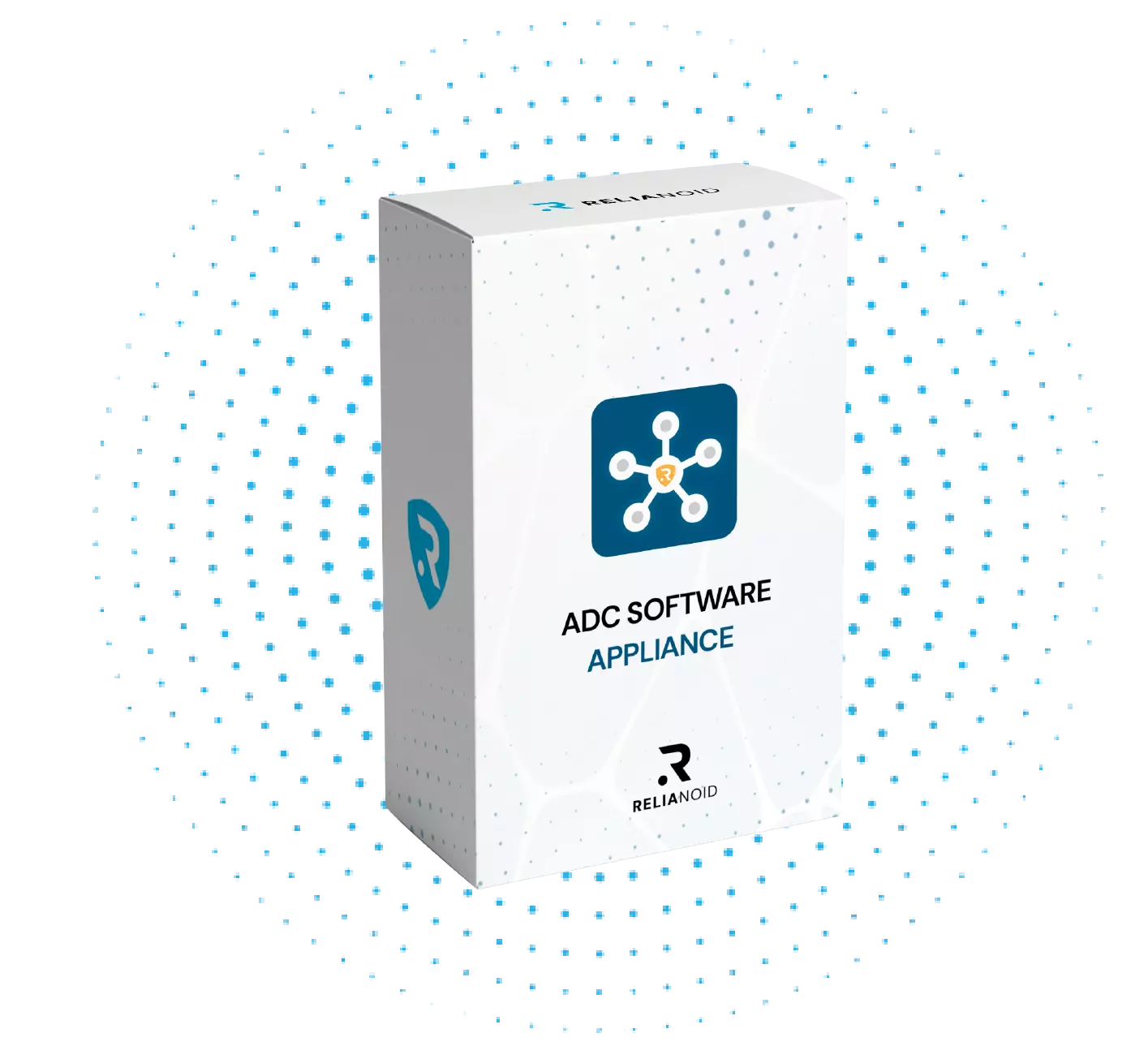Azure Load Balancer
Unlock the full potential of your cloud infrastructure with RELIANOID’s advanced Azure Load Balancing software
Azure Load Balancer by RELIANOID
Our Azure Load Balancer Software Appliance delivers a cutting-edge solution for efficiently managing and distributing traffic across your applications within Microsoft Azure. Built to enhance both performance and availability, it ensures your cloud infrastructure operates at its best.
WHATS INCLUDED IN RELIANOID Azure LOAD BALANCER?
Designed to elevate your cloud-based services to new heights of performance, reliability, and security, our Azure Load Balancer ensures efficient traffic distribution, adaptive load balancing, optimized resource usage, and reinforced protection against cyber threats, all while leveraging the powerful capabilities of Microsoft Azure.
Key features of Azure Load Balancer
Uninterrupted Uptime
Azure’s redundancy ensures continuous service with minimal interruptions.
Elastic Scalability
Automatically adjusts resources in real-time to handle varying traffic loads seamlessly.
Comprehensive Security
Advanced security tools, including Azure Security Center and DDoS Protection, safeguard your cloud services.
Effortless Integration
Integrates smoothly with Azure services like Virtual Machines, App Services, and Kubernetes for easy setup.
Smart Traffic Management
Intelligent algorithms optimize traffic distribution, enhancing performance and reducing bottlenecks.
Global Coverage with Low Latency
Microsoft’s global network ensures fast, low-latency connections across data centers worldwide.
Azure Load Balancer Performance
Detailed information on Azure Load Balancer solutions
System Specifications
Multilayered Azure Load Balancer
A comprehensive Application Delivery Controller solution designed to serve as a flexible and highly available Azure Load Balancer. It supports multilevel functionality across L2, L3, L4, and L7, allowing for optimal traffic management, robust application delivery, and seamless scalability in Microsoft Azure environments.
64-Bit Long-Support Linux OS with Clustering Support
Purpose-built for 64-bit platforms running a Long-Support Linux OS, this Azure Load Balancer provides enhanced performance, resource management, and robustness, utilizing multi-core CPUs to deliver an efficient, fully optimized 64-bit system tailored for Azure infrastructure. Stateful cluster integrated for high availability of load balancing services.
RELIANOID Enterprise Edition v8
Featuring the latest stable version of RELIANOID’s Enterprise Edition, this Azure Load Balancer includes enterprise-grade performance improvements, enhanced security features, usability refinements, and advanced management capabilities, making it ideal for demanding Azure workloads.
Responsive Web GUI for Azure Management
The responsive web-based GUI is designed for managing the Azure Load Balancer seamlessly across different devices. The intuitive interface offers enhanced usability and accessibility, allowing administrators to efficiently monitor and manage load balancing resources from any device.
REST JSON API for Azure Load Balancing Automation
This Azure Load Balancer supports automation with a REST JSON API, enabling programmatic control to view, create, delete, and modify load balancing resources, including farms, backends, farm guardian, statistics, and network interfaces. This API ensures scalability and automation for Azure load balancing operations.
Limitless System Capabilities in Azure
The RELIANOID Software Appliance (RSA) series for Microsoft Azure offers unrestricted system resources, with no limits on CPU usage, CPU cores, bandwidth, farms, or backends. This allows Microsoft Azure users to fully maximize the load balancer’s capabilities without restrictions on core count, memory, or throughput, ensuring peak performance in high-demand Microsoft Azure environments.
Features
Multi-Layer Load Balancing
Supports L2, L3, L4, and L7 load balancing for seamless traffic management across Azure applications, data centers, and services.
Broad Protocol Compatibility
Works with major protocols (TCP, UDP, HTTP, HTTPS, DNS, etc.) and applications like MS Exchange, Citrix, and Lync.
High-Performance Proxy
Includes HTTP/2 support and hot restart for uninterrupted sessions.
Advanced HTTP/HTTPS Features
Offers session persistence, SSL certificates, reverse proxy, and other features for secure and efficient app delivery.
Intelligent Health Checks & Scalability
Monitors server health and balances traffic using algorithms like round robin, CPU load, and least connections.
Disaster Recovery & High Availability
Configuration backups and active-passive stateful clustering ensure high availability.
Comprehensive Monitoring
Real-time service monitoring with alert notifications via email and SNMP for proactive management.
Advanced Network Management
Supports VLANs, virtual IPs, link aggregation, IPv6, VPN services with IPsec, and NAT/DSR topologies for complex network configurations.
Automation & Security Compliance
REST+JSON API for automation, SSL Labs A+, PCI DSS, DORA and HIPAA compliance.
Integrated IPS Security Module
Features a Web Application Firewall, local and remote blacklists, DNS-based blackhole lists (DNSBL), and DDoS protection to safeguard Microsoft Azure-hosted applications.
MFA Support
High performance for scalable Microsoft Azure deployments with multi-factor authentication integration for web applications.
Requirements
Network Interface Configuration
Minimum of one Network Interface Card (NIC) is required, with two recommended—one dedicated for administration purposes and another for production services. This configuration ensures optimized performance and security for the Azure Load Balancer.
Instance Type Selection
Choose instance types of D2 or D4 series based on the specific load balancing needs of your services. The selected instance type should align with expected traffic volume and performance requirements to ensure efficient operation of the Azure Load Balancer.
Resource Allocation
Adequate allocation of CPU and memory resources to support the intended traffic and application demands, ensuring the Azure Load Balancer operates effectively under various load conditions.
Security Groups and Network ACLs
Configure appropriate security groups and network access control lists (ACLs) to restrict access and enhance security for the Azure Load Balancer.
Licensing
The software included in the RSA Enterprise Edition is provided under the terms of the GNU Affero General Public License v3.
The licensing model for RSA products is tied to the number of instances deployed under the BYOL (Bring Your Own License) framework. Therefore, the number of appliance licenses required corresponds directly to the number of deployments, regardless of resource allocation such as CPU, memory, or throughput per instance.
If only a single node is necessary, you will need to purchase one appliance license. However, if a clustered load balancing service is required, you will need two appliance licenses.
Each appliance can be updated and upgrade to a major release with incremental software releases provided through a valid Support Plan with a simple update procedure.
Additionally, redeployment during the appliance’s lifecycle is permitted as long as the hostname remains unchanged. If you need to change the hostname of the appliance without a related redeployment, an appliance certificate can be reissued.
FAQs
How Does the Evaluation Work?
The evaluation of this product is free and allows you to deploy, create, and utilize the full version for one month by default. If you need an extension beyond this period, you can request it to our Sales Team. During the evaluation phase, free pre-sales support is available. Once you’ve decided to make a purchase, you simply need to obtain a definitive activation certificate without redeploying the appliance.
How to Upgrade from Community to Enterprise Edition?
Seamless upgrade from Community to Enterprise Edition is fully supported without redeploying the appliances and required migration of configuration files are automatically performed. Contact with our Team for more information.
How Many Licenses Are Needed to Build a Cluster?
To build a cluster and achieve high availability (HA), you will need to acquire two licenses with the same Support Level.
The RELIANOID cluster operates as a stateful cluster, meaning that if the primary node goes down, the second node automatically takes over without any disruption to clients. This functionality is possible because the second node continuously synchronizes configurations, automatic processes, connections, and user sessions, ensuring both nodes remain online at all times. This setup allows for a quick switch between nodes.
Is Support Included with the Appliance?
Support services are not included with the appliance and must be purchased separately to receive updates, security advisories, patches, hotfixes, and assistance from our specialized Support Team. We offer three different support plans tailored to various application requirements, ranging from updates-only options to 24×7 support services. First year of support will be mandatory.
Are Disaster Recovery and Development licenses available?
Yes, we offer special licenses for Disaster Recovery and Development purposes. Please reach out to our Sales Team for more information.
Built for Microsoft Azure Infrastructure
Our Azure Load Balancer integrates seamlessly into the Microsoft Azure ecosystem, offering native compatibility with key services like Azure Virtual Networks, Virtual Machines, and SQL Databases. This ensures a smooth deployment, with automated traffic distribution and simplified scaling for businesses of all sizes.
Benefits of Using RELIANOID Azure Load Balancer
RELIANOID’s Azure Load Balancer provides more than just traffic distribution—it delivers enhanced reliability, security, and cost efficiency. With integrated protection against common threats, your services are safeguarded while maintaining high availability for end-users.
Simplified Management and Monitoring
Enjoy centralized control through the Azure portal, allowing you to manage and monitor all your load balancing resources from a single interface. With built-in logging and diagnostics, you can track performance metrics and make real-time adjustments to keep your network running smoothly.
Cost Efficiency with Azure Load Balancer
Reduce operational costs by paying only for the resources used. Azure’s elastic pricing model allows you to scale your load balancing needs based on real-time demand, ensuring optimal performance without unnecessary expenses.
Integration with Azure
Our Azure Load Balancer Software Appliance seamlessly integrates with a wide range of Microsoft Azure services, ensuring comprehensive and optimized traffic management for your cloud applications.
Azure Virtual Machines
Load balancing across Virtual Machines (VMs) to distribute incoming traffic, ensuring optimal performance, high availability, and efficient resource utilization for your applications.
Azure Blob Storage
Supports secure and scalable storage solutions, enabling seamless management of large datasets, while improving overall application performance and data access speed.
Azure SQL Database
Provides efficient load balancing for database queries and replication, enhancing the availability and speed of data access for critical applications.
Azure Monitor
Delivers real-time monitoring and alerts, offering detailed insights into the performance and availability of your applications and services across the Azure environment.
Azure Functions
Optimizes traffic flow to serverless functions, ensuring that Azure Functions handle and process requests efficiently, allowing for scalable and cost-effective serverless computing.
Use cases for Azure Load Balancer
Web and Mobile Applications
Perfect for managing fluctuating traffic and high user demand, ensuring consistent performance and availability in Azure-hosted applications.
Microservices
Facilitates efficient traffic distribution within microservices architectures, optimizing communication between services in an Azure cloud environment.
E-commerce
Guarantees availability and seamless user experiences during traffic spikes, providing reliable scaling and load management for your online storefront.
Enterprise Applications
Boosts the performance and availability of critical business applications, ensuring uninterrupted access and optimized resource utilization within Azure.
Get Started with RELIANOID Azure Load Balancer
Ready to optimize your cloud infrastructure with Azure Load Balancer? Contact us today to learn more about how RELIANOID’s solution can enhance your Azure cloud environment, ensuring a reliable, secure, and scalable experience.
WAYS TO
GET STARTED














